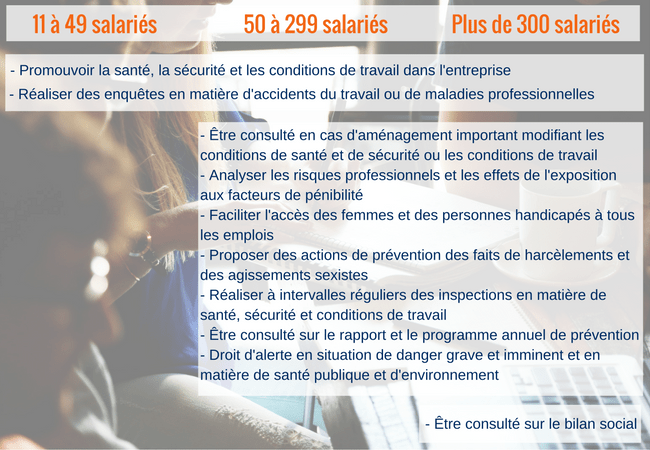The employee delegates (DP), works council (CE) and health, safety and working conditions committee(CHSCT) will be replaced by the social and economic committee(CSE).
An ordinance dated September 22, 2017 [1] (one of the 5 "Macron" ordinances) effectively merges these staff representative institutions. The ordinance creates articles L. 2311-1 to L. 2321-10 in the second legislative part of the Labor Code, dealing with the social and economic committee.
We would like to introduce you to this new body, and more specifically to its responsibilities and operating rules in relation to health, safety and working conditions issues.
Setting up the Social and Economic Committee
A CSE must be set up in companies with at least 11 employees if this number is reached for at least 12 consecutive months. The term of office for its members is set at 4 years. However, a branch, group or company agreement may set a term of office of between 2 and 4 years.
In companies with at least two separate workplaces, local works councils (CSE) and a central works council (CSE central d'entreprise) are set up. In this case, a company agreement determines the perimeter of the separate establishments (number and powers of local representatives, particularly in terms of health, safety and working conditions; procedures for their appointment, etc.). In the absence of an agreement, the employer determines the number and scope of separate establishments.
Health, safety and working conditions: responsibilities of the CSE

Social and Economic Committee meetings
The Social and Economic Committee meets as follows:

Health, safety and working conditions committee (CSSCT)
A health, safety and working conditions committee has been set up:
- in companies and separate establishments with at least 300 employees;
- Seveso high-threshold facilities (companies with over 50 employees);
- basic nuclear installations (INB), underground storage facilities, mines and geothermal deposits (companies with over 50 employees).
The Labour Inspector may, however, impose the creation of a CSSCT in separate companies or establishments with between 50 and 299 employees if he deems this measure necessary, notably because of the nature of the activities, layout or equipment of the premises.
This commission is entrusted with some or all of the CSE's responsibilities relating to health, safety and working conditions, with the exception of the use of an expert and the CSE's consultative responsibilities. It is chaired by the employer or his representative and comprises at least three employee representatives. Its members are appointed by the CSE from among its members for a term of office equal to that of the CSE members.
Health, safety and working conditions training for CSE members
Members of the CSST, where it exists, or members of the CSE staff delegation, must receive the training they need to carry out their duties in terms of health, safety and working conditions. This training is financed by the employer.
For CSST members, this training is organized on at least :
- 5 days in companies with at least 300 employees;
- 3 days in companies with fewer than 300 employees.
Timetable for setting up the CSE
Decrees, due to be published by the end of the year, will specify the application of the provisions created by the ordinance. These new provisions will apply from the date of entry into force of the decrees, but no later than January 1, 2018.
The setting up of the CSE to replace the DP, CHSCT and/or CE depends on the expiry date of the mandates:

We recommend :
- take stock of the situation with your HR department to define the timetable and procedures for setting up the Social and Economic Committee within your company or establishment,
- wait for the application decrees to be published before taking any action.
Other provisions, not developed in this article, have been put in place. In particular, they concern the Central Works Council, the use of an authorized expert, and internal and external communications.
[1] Order no. 2017-1386 of September 22, 2017 [JORF of September 23, 2017].


.svg)



